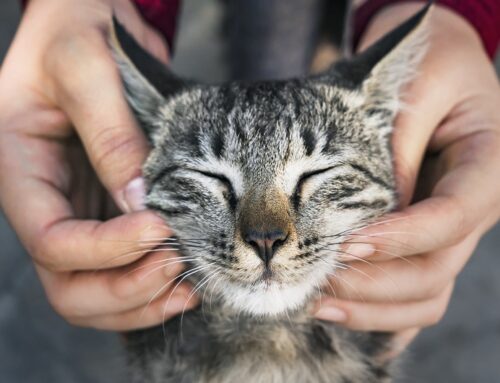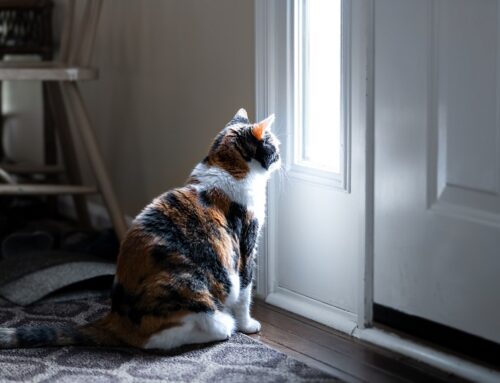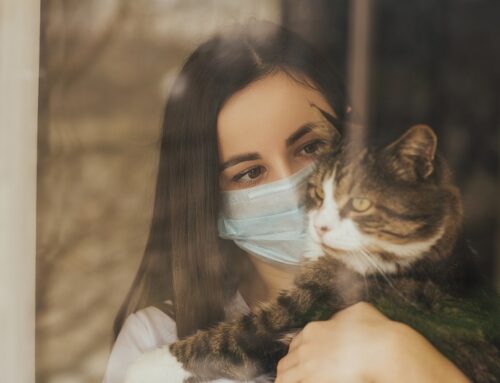This month’s newsletter is dedicated to “Percy”. Percy is a cat that was brought to us by a Good Samaritan after they found him on a hiking trip in the middle of nowhere. He has come a long way in a short time. When he first arrived, he was so matted that we could not tell if he was a male or female, and he was so thin that we thought he was an old cat with a chronic disease. But, no! We found that he is actually quite young and very affectionate. Percy is now neutered, dewormed, and up-to-date on vaccines. He is up for adoption to a suitable home. So, what’s the catch? Percy is FIV positive. But, what does this mean?
FIV stands for Feline Immunodeficiency Virus and is very similar to Human Immunodeficiency Virus (HIV) in people. FIV is found worldwide. There are 5 different subtypes of the virus (A, B, C, D and E) with subtype A and B being the predominant forms of FIV in the United States. Like HIV in humans, FIV eventually causes an acquired immunodeficiency syndrome (AIDS) in domestic cats. The virus is characterized by a long period of clinical latency during which immune function gradually deteriorates. Eventually, AIDS develops and is accompanied by opportunistic infections, systemic diseases, and malignancies. FIV does not cause HIV in people.
The main mode of transmission of FIV is via bite wounds. The virus can also be transmitted to kittens in utero from infected queens and through milk (in nursing kittens). Females can potentially become infected by breeding with an infected male. Transmission between household cats that do not fight is uncommon but possible. FIV is unstable in the environment and is easily inactivated by common detergents and disinfectants.
Clinical signs of FIV infection can vary widely. Cats can experience a clinically asymptomatic phase that can last for several years. However, cats with FIV are more prone to concurrent infections, and clinical signs may reflect those concurrent diseases, such as fever, lethargy, enlarged lymph nodes, weight loss, and abscesses. Any early signs of illness should be treated right away (as opposed to waiting and seeing if they get better on their own), as cats with FIV are more prone to developing complications, such as pneumonia from a mild upper respiratory infection. FIV cats also seem more prone to dental disease, especially gingivostomatitis (redness of the oral tissue) and require routine dental care such as daily brushing and periodic professional cleaning. As there is no cure for gingivostomatitis, the affected teeth need to be removed, and for some cats, this can mean all of the teeth.
Currently, there is no treatment for FIV. Several antiviral medications have been studied, but so far, the best treatment is good routine care and monitoring. An FIV vaccine is available, but the immunity is questionable, and all vaccinated cats will show positive on tests for FIV. At this time, I do not recommend the FIV vaccine.
So, what is the take-home message? FIV is not an immediate death sentence. Once AIDS develops, then death will occur, but many cats will live well into their teens; and some will die of other age-related diseases without ever developing AIDS. Cats with FIV should have semi-annual examinations and stay current on vaccines. They should be kept indoors to prevent spread through fighting and to limit their exposure to pathogens. Cats with FIV can live with other cats as long as they do not fight (rough-housing and play fighting are not the same as aggressive fighting where the skin is frequently punctured by teeth). Transmission of FIV between housemates that don’t fight is possible, but I have been unable to find any reports of this actually occurring.
Just a few other comments on Percy: Although I cannot find any abnormalities, his vision is not the best. He gets around well but will occasionally bump into things. He is VERY affectionate but not a great groomer, so daily brushing is needed. He is showing early signs of possibly developing stomatitis in the future, but so far, no treatment is needed at this time. If you are interested in giving Percy a good home, please call the clinic at 406-728-0022 to set up a time to visit with him. We are only asking for a $40.00 adoption fee to help cover his medical care so far.
Thank you, and enjoy beginning of autumn! =^_^=








